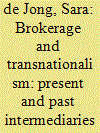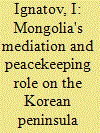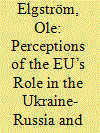| Srl | Item |
| 1 |
ID:
161134


|
|
|
|
|
| Summary/Abstract |
This article brings two distinct sets of literatures in dialogue with one another: ethnohistorical studies on cultural brokerage and mediation in colonial/settler societies and studies of contemporary transnational activities. The article argues that this is productive because it throws into sharper relief three significant areas of contention that are a common thread of many empirical transnational studies, but are rarely of central concern. For each of these three identified aspects, respectively, the desire for mediation, social mobility, and mixed loyalties, it traces the historical resonance with cultural brokerage and shows how ethnohistorical research can complicate current transnational studies. It thereby challenges transnational scholarship’s focus on the newness of transnational exchange and demonstrates how ethnohistorical findings on brokers and mediators can aid the development of the research agenda of transnational studies.
|
|
|
|
|
|
|
|
|
|
|
|
|
|
|
|
| 2 |
ID:
079005


|
|
|
|
|
| Publication |
2007.
|
| Summary/Abstract |
This study investigates the informal mediations of 100 Israeli and 100 U.S. mediators. It was predicted that Israeli mediators - because of their collectivistic values and Dugri communication style - would be more assertive than their U.S. counterparts. Specifically, the Israelis were expected to put the disputants together more frequently, advise the disputants on how to act, and more often suggest concessions. We also compared the mediations of the Sepharadic Israelis (whose roots lie in Middle Eastern culture) to that of the Ashkenasim (of a European background). The former group was expected to be more assertive because of their collectivism. The data - based upon 200 personal interviews - support the hypothesis for international (Israeli-U.S.) differences but not for those between the Sepharadic and Ashkenasim.
|
|
|
|
|
|
|
|
|
|
|
|
|
|
|
|
| 3 |
ID:
191148


|
|
|
|
|
| Summary/Abstract |
We build a simple overlapping generation model to investigate the effect of life expectancy on the real exchange rate where fertility is chosen endogenously. The model reveals that, although the overall effect of life expectancy on the real exchange rate is not certain, longer life expectancy tends to cause the real exchange rate to depreciate by reducing fertility. Fertility thus serves as a mediator in the effect of life expectancy on the real exchange rate. Evidence from 148 economies (1980–2018) shows a statistically significant and robust negative relationship between life expectancy and the real exchange rate. It is estimated that a 1 year increase in life expectancy is associated with a 1.5 percent depreciation in the real exchange rate. The evidence also confirms the mediated effect of fertility. The mediated effect that fertility exerts accounts for 30 percent to 50 percent of the total effect, depending on the real exchange rate index used.
|
|
|
|
|
|
|
|
|
|
|
|
|
|
|
|
| 4 |
ID:
022499


|
|
|
|
|
| Publication |
Autumn 2002.
|
| Description |
171-175
|
|
|
|
|
|
|
|
|
|
|
|
|
|
|
|
| 5 |
ID:
179227


|
|
|
|
|
| Summary/Abstract |
This article examines the role of Mongolia as a mediator and peacemaker in the settlement of the conflict on the Korean Peninsula in line with its "third neighbor" foreign policy concept. The author shows why Mongolia enjoys the confidence of the parties involved in the conflict and is perceived by them as a most suitable mediator. He proceeds to analyze the actual mediation activities of the Mongolian leadership concerning Korea, including confidence-building measures with both states of the Korean Peninsula, organization of bilateral and multilateral meetings and negotiations on Mongolian soil, and the establishment of an international dialog platform in the form of the international conference known as the Ulaanbaatar Dialog on Northeast Asia Security. In conclusion the author points out that friendly relations of Mongolia with the Democratic People's Republic of Korea (DPRK) and the Republic of Korea gain special significance in the context of current deterioration of relations between North and South Koreas, since it is the Mongolian side that will be able to give support to the parties in conflict and their allies in resolving acute issues during the current crisis.
|
|
|
|
|
|
|
|
|
|
|
|
|
|
|
|
| 6 |
ID:
159781


|
|
|
|
|
| Summary/Abstract |
This article focuses on how the European Union’s (EU) mediation activities during the Russia-Ukraine and Israel-Palestine conflicts are perceived by local elites. Our analysis is based on recent interviews with decision makers in Ukraine, Israel and Palestine. Consistent with this special issue, we investigate perceptions of EU roles, strategies and effectiveness. We suggest that the EU’s relation to the parties may affect their perceptions of EU conflict mediation efforts. Specifically, we expect that the EU is perceived as a biased mediator in both cases due to perceived close relations to one or more conflict parties. However, contrary to our expectations and widespread assumption in mediation theory, while such a bias exists, we found it is not perceived as a main cause of EU ineffectiveness. Other factors, including the prominence of other mediators and internal EU disunity, are perceived as more detrimental to EU efficacy.
|
|
|
|
|
|
|
|
|
|
|
|
|
|
|
|